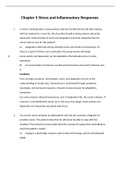-
1. Exam (elaborations) - Chapter 68 disaster nursing
-
2. Exam (elaborations) - Chapter 67 emergency nursing
-
3. Exam (elaborations) - Chapter 66 management of patients with infectious diseases
-
4. Exam (elaborations) - Chapter 65 management of patients with oncologic or degenerative neurologic disorders
-
5. Exam (elaborations) - Chapter 64 management of patients with neurologic infections, autoimmune disorders, a...
-
6. Exam (elaborations) - Chapter 63 management of patients with neurologic trauma
-
7. Exam (elaborations) - Chapter 62 management of patients with cerebrovascular disorders
-
8. Exam (elaborations) - Chapter 61 management of patients with neurologic dysfunction.
-
9. Exam (elaborations) - Chapter 60 assessment of neurologic function
-
10. Exam (elaborations) - Chapter 59 assessment and management of patients with hearing and balance disorders.
-
11. Exam (elaborations) - Chapter 58 assessment and management of patients with eye and vision disorders
-
12. Exam (elaborations) - Chapter 57 management of patients with burn injury
-
13. Exam (elaborations) - Chapter 56 management of patients with dermatologic disorders
-
14. Exam (elaborations) - Chapter 55 assessment of integumentary function
-
15. Exam (elaborations) - Chapter 53 assessment and management of patients with male reproductive disorders
-
16. Exam (elaborations) - Chapter 52 assessment and management of patients with breast disorders
-
17. Exam (elaborations) - Chapter 51 management of patients with female reproductive disorders
-
18. Exam (elaborations) - Chapter 50 assessment and management of patients with female physiologic processes
-
19. Exam (elaborations) - Chapter 49 management of patients with urinary disorders
-
20. Exam (elaborations) - Chapter 48 management of patients with kidney disorders
-
21. Exam (elaborations) - Chapter 47 assessment of kidney and urinary function
-
22. Exam (elaborations) - Chapter 46 management of patients with diabetes
-
23. Exam (elaborations) - Chapter 45 assessment and management of patients with endocrine disorders
-
24. Exam (elaborations) - Chapter 44 management of patients
-
25. Exam (elaborations) - Chapter 43 assessment and management of patients with hepatic disorders
-
26. Exam (elaborations) - Chapter 42 assessment and management of patients with obesity
-
27. Exam (elaborations) - Chapter 41 management of patients with intestinal and rectal disorders
-
28. Exam (elaborations) - Chapter 40 management of patients with gastric and duodenal disorders
-
29. Exam (elaborations) - Chapter 39 management of patients with oral and esophageal disorders
-
30. Exam (elaborations) - Chapter 38 assessment of digestive and gastrointestinal function
-
31. Exam (elaborations) - Chapter 37 management of patients with musculoskeletal trauma
-
32. Exam (elaborations) - Chapter 36 management of patients with musculoskeletal disorders
-
33. Exam (elaborations) - Chapter 35 assessment of musculoskeletal function
-
34. Exam (elaborations) - Chapter 34 assessment and management of patients with inflammatory rheumatic disorder...
-
35. Exam (elaborations) - Chapter 33 assessment and management of patients with allergic disorders
-
36. Exam (elaborations) - Chapter 32 management of patients with immune deficiency disorders
-
37. Exam (elaborations) - Chapter 31 assessment of immune function
-
38. Exam (elaborations) - Chapter 30 management of patients with hematologic neoplasms
-
39. Exam (elaborations) - Chapter 29 management of patients with nonmalignant hematologic disorders
-
40. Exam (elaborations) - Chapter 28 assessment of hematologic function and treatment modalities
-
41. Exam (elaborations) - Chapter 27 assessment and management of patients with hypertension
-
42. Exam (elaborations) - Chapter 26 assessment and management of patients with vascular disorders and problems...
-
43. Exam (elaborations) - Chapter 25 management of patients with complications from heart disease
-
44. Exam (elaborations) - Chapter 24 management of patients with structural, infectious, and inflammatory cardi...
-
45. Exam (elaborations) - Chapter 23 management of patients with coronary vascular disorders
-
46. Exam (elaborations) - Chapter 22 management of patients with arrhythmias and conduction problems
-
47. Exam (elaborations) - Chapter 21 assessment of cardiovascular function
-
48. Exam (elaborations) - Chapter 20 management of patients with chronic pulmonary disease
-
49. Exam (elaborations) - Chapter 19 management of patients with chest and lower respiratory tract disorders
-
50. Exam (elaborations) - Chapter 18 management of patients with upper respiratory tract disorders
-
51. Exam (elaborations) - Chapter 17 assessment of respiratory function
-
52. Exam (elaborations) - Chapter 16 postoperative nursing management
-
53. Exam (elaborations) - Chapter 15 intraoperative nursing management
-
54. Exam (elaborations) - Chapter 14 preoperative nursing management
-
55. Exam (elaborations) - Chapter 13 palliative and end-of-life care
-
56. Exam (elaborations) - Chapter 12 oncologic management.
-
57. Exam (elaborations) - Chapter 11 shock, sepsis, and multiple organ dysfunction syndrome
-
58. Exam (elaborations) - Chapter 10 fluid and electrolytes
-
59. Exam (elaborations) - Chapter 9 pain management
-
60. Exam (elaborations) - Chapter 8 management of the older adult patient
-
61. Exam (elaborations) - Chapter 7 disability and chronic illness
-
62. Exam (elaborations) - Chapter 6 genetics and genomics in nursing
-
63. Exam (elaborations) - Chapter 5 stress and inflammatory responses
-
64. Exam (elaborations) - Chapter 4 adult health and physical, nutritional, and cultural assessment.
-
65. Exam (elaborations) - Chapter 3 health education and health promotion
-
66. Exam (elaborations) - Chapter 2 medical-surgical nursing
-
67. Exam (elaborations) - Chapter 1 professional nursing practice
-
Show more




